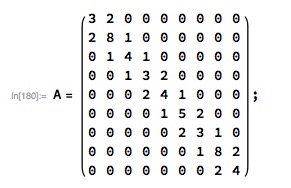I am having a huge problem with my Mathematica notebook.
I am trying to evaluate LUDecomposition and it keeps getting wrong - when I multiply l and u, I get my A matrix, but the first row is displayed as the last. I have no idea how to fix it...

My A matrix looks like this:
A = {{3, 2, 0, 0, 0, 0, 0, 0, 0}, {2, 8, 1, 0, 0, 0, 0, 0, 0}, {0, 1, 4, 1, 0, 0, 0, 0, 0}, {0, 0, 1, 3, 2, 0, 0, 0, 0}, {0, 0, 0, 2, 4, 1, 0, 0, 0}, {0, 0, 0, 0, 1, 5, 2, 0, 0}, {0, 0, 0, 0, 0, 2, 3, 1, 0}, {0, 0, 0, 0, 0, 0, 1, 8, 2}, {0, 0, 0, 0, 0, 0, 0, 2, 4}};
What I do is:
{lu, p, c} = LUDecomposition[A];
l = LowerTriangularize[lu, -1] + IdentityMatrix[Length[p]];
u = UpperTriangularize[lu];
P = Part[IdentityMatrix[Length[p]], p];
MatrixForm /@ {P.A, P, l, u, l.u};
And I get:
 The last one should equal my
The last one should equal my A matrix, but obviously it does not. It seems like the first row is the last one. Do you have any idea why? I will be very grateful for any kind of help because it is getting me really crazy.

l.ugoes by the permutation of the rows done. So you need to considerpas well. $\endgroup$